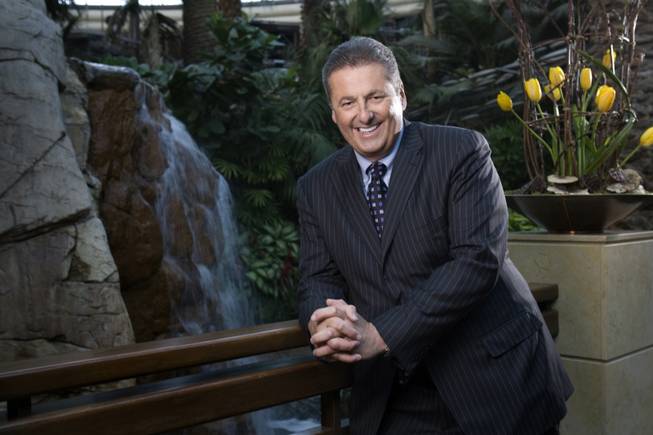Sunday, March 30, 2014 | 2 a.m.
Shortly after opening New York-New York, Felix Rappaport decided to do something with the hotel’s sports book.
He took it apart.
In that space, Rappaport ordered up a new venue to be the home for star comedian Rita Rudner. He had caught Rudner’s act at the old Catch a Rising Star comedy club at MGM Grand (which was taken apart to make room for the La Femme/Crazy Horse Paris topless revue, which itself was taken down to make possible Beacher’s Madhouse).
But the joke was almost on Rudner: The Manhattan Express roller coaster rumbled through the property every three minutes and was audible to anyone trying to hear her act. Rappaport first ordered the thrill ride parked during Rudner’s show while he went to work on solving the noise problem. He finally deduced that the reverberation was centered in the theater’s hollow pillars. He had all of those beams filled with sand, which muffled the Manhattan Express enough that Rudner could perform.
For six sold-out years.
That’s how Rappaport operated in Las Vegas as he opened five hotels in more than two decades. Top to bottom. In doing so, he gained a reputation as one of Las Vegas’ most influential change agents — someone who few visitors knew, but who had a huge impact on their experience.
Rappaport learned to pay meticulous attention to detail from one of the greats, Steve Wynn, who hired him to run Treasure Island in the run-up to that hotel’s opening in 1993. As Wynn recalled when asked about Rappaport years ago, Treasure Island was originally intended to be the second tower for the Mirage. But in opening a separate resort, Wynn plucked Rappaport from Station Casinos (for whom he opened Boulder Station) to enact his vision over the famously pirate-inspired Treasure Island.
Those who have worked with Wynn have noted acute attention to detail — how he examined the seams in wall coverings from a distance of inches, and how he would spend two hours examining table linens spread out on a conference room table.
Rappaport, too, has been a master at fine-tuning. He ran the Luxor during the period when the hotel was shedding an Egyptian theme that was rapidly becoming trite (there was even an idea floated that the hotel would change its name to Pyramid). He moved to the Mirage and quickly began talking of revamping the hotel’s restaurant lineup. There was talk of building a new entertainment venue, something akin to a small showroom. The nightclub 1Oak was opened under Rappaport’s tenure.
A rapid thinker who was adept at framing ideas in a remarkably persuasive way, the 61-year-old Rappaport had long enjoyed strong support among employees and his fellow executives.
But then, amid changes in the hierarchy of MGM Resorts, a man well-known, highly regarded and personally popular for more than two decades in Las Vegas abruptly left his post.
In December 2012, MGM Resorts announced Rappaport’s departure from the Mirage. He left the hotel just two weeks after Bill McBeath left his position as head of CityCenter in a mutually agreed-upon change in command at Mirage.
Rapapport spent the next year surveying the landscape in Las Vegas and across the country, finally landing at Foxwoods Resort in Mashantucket, Conn. He started work in February, during Super Bowl weekend.
Foxwoods is a familiar environment for Rappaport in that it’s a massive gaming resort — 7 million square feet, with 3,200 suites and a casino floor 40 percent larger than that of the Mirage. But it presents new challenges, too. Equidistant between Boston and New York, Foxwoods draws tourists who stay for less than two days. There is no such thing as incidental, unplanned, walk-in business at Foxwoods that Strip hotels enjoy.
“We have a funnel effect, bringing in 50,000 people a day,” Rappaport said. “We want to keep them coming back here.” It’s the sort of “stickiness” Rappaport often spoke of when noticing that, when he took over at Luxor, the cab line leaving the hotel was a lot longer than the line dropping off guests.
Now, he’s taking the assess-and-improve strategy he perfected here and applying it to Foxwoods. Deep into a recent phone conversation, he made it clear his job in Connecticut wasn’t just a baby-sitting project, saying, “In my opinion, Foxwoods needs attention.”
Clearly, Las Vegas has arrived in Connecticut. Expect Rappaport to shake up the scene at Foxwoods the same way he left his imprint on the many hotels he ran on the Strip. That’s what he does, and the vision that filled resorts — and also filled pillars with sand — will be Rappaport’s Las Vegas legacy.


Join the Discussion:
Check this out for a full explanation of our conversion to the LiveFyre commenting system and instructions on how to sign up for an account.
Full comments policy